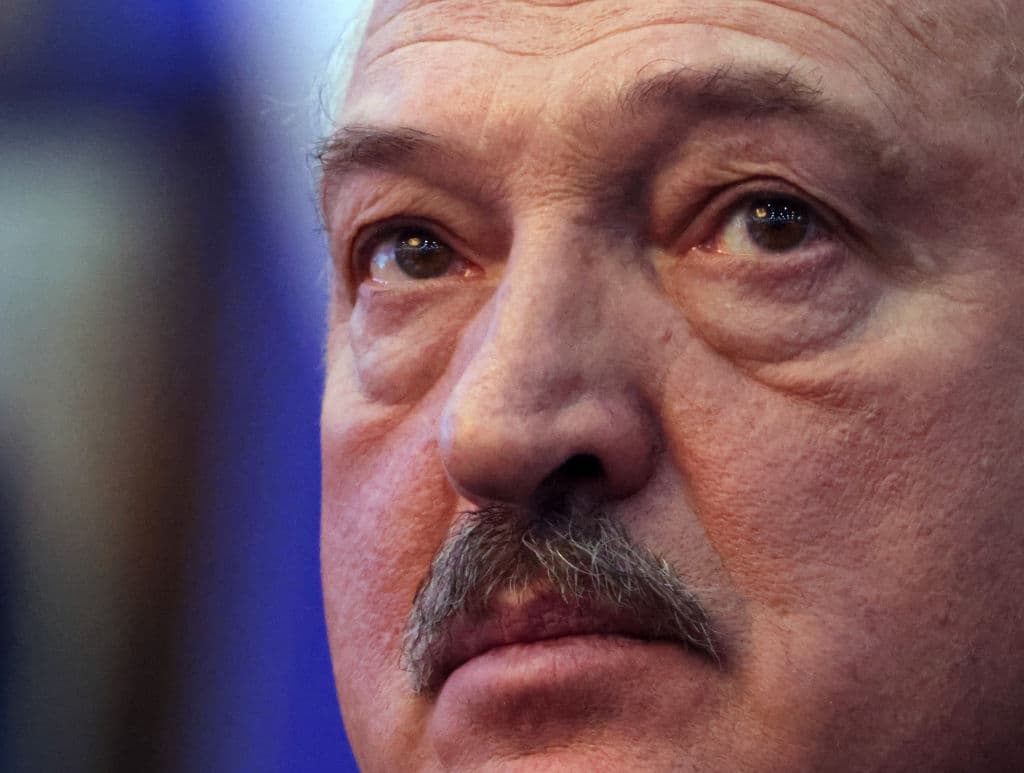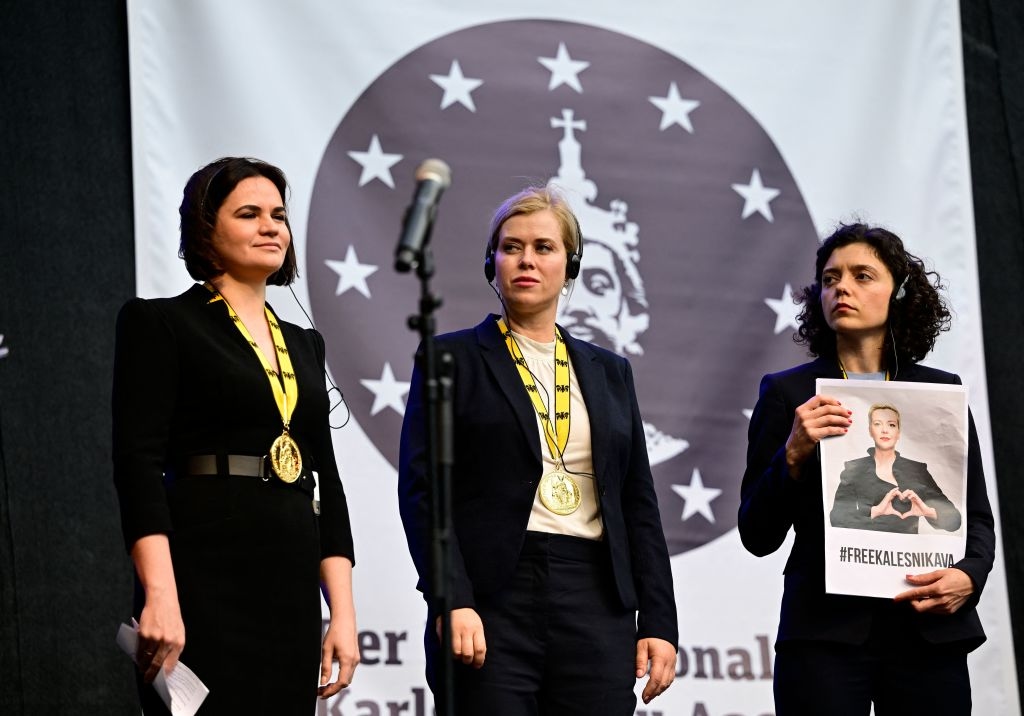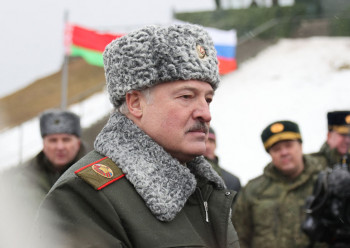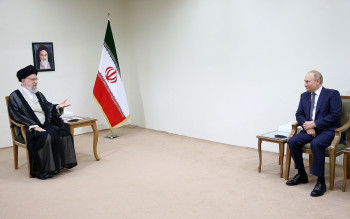Belarus Weekly: Russia re-deploys MiG-31K supersonic aircraft to Belarus

Following a visit by Russian Defense Minister Sergei Shoigu last week, Belarus conducted a sudden inspection of troops' and continues to engage in covert mobilization.
Russia deploys additional military aircraft to Belarus, including those capable of carrying Kinzhal ballistic missiles.
As Belarus launches the first in absentia trials against several political activists, the attorneys representing three political prisoners lose their licenses.
Belarus' Central Bank removes the euro from its currency basket weightings, increasing the weight given to the Russian ruble.
In his bid to distance Belarus from the West, dictator Alexander Lukashenko calls for the nationalization of foreign-owned enterprises in Belarus.
Belarus conducts sudden inspection of troops' combat readiness
Belarus' Defense Ministry said on Dec. 13 that it is conducting an impromptu inspection of its troops' combat readiness following an order from Belarusian dictator Lukashenko.
"The measures will be comprehensive; the troops will advance to the designated areas as soon as possible, implement their engineering equipment, organize security and defense, and build bridge crossings across the Neman and Berezina rivers," the ministry said in a statement.
Following the statement, the monitoring group Belarusian Hajun said it is important to "emphasize that these rivers are not located near the border with Ukraine."
On Dec. 9, Russian Defense Minister Shoigu visited Belarus as Minsk and Moscow signed a rushed classified protocol on regional security.
After signing the document, Shoigu met with Lukashenko in Minsk. During the meeting, Lukashenko openly acknowledged that Minsk and Moscow are conducting joint training of troops in Belarus.
According to Andrii Yusov, a spokesperson for the Ukrainian Defense Ministry's Intelligence Directorate, Shoigu's visit to Minsk may have been intended to pressure Belarus into joining Russia's full-scale war against Ukraine.
However, the Institute for the Study of War noted on Dec. 13 that Belarus is unlikely to invade Ukraine due to the possibility of renewed domestic unrest if its security apparatus is weakened through participation in a costly war in Ukraine.
Belarusians receive instructions 'in case of war'
As Belarus conducts "verification of the military conscripts," meaning listing those fit for service, Belarusians receive "instructions in case of war."
To receive such instructions, Belarusian men are ordered to attend conscript offices, making it a criminal offense not to show up.
On Dec. 13, local media from Baranavichy shared a story of a Belarusian receiving such an order requiring him to report in 38 hours to the mobilization point with his passport, military ID card, and private belongings without waiting for a summon.
According to the Belarusian medical initiative Belye Khalaty (White robes), such orders are also given to medical personnel. The initiative reports cases in which medical departments are attached to a military unit and are obligated to serve in case of war.
Officially, the Belarusian Defence Ministry claims the ongoing procedures are routine and denies that active conscription is ongoing.
Lukashenko ordered to "quietly check" the numbers of available conscripts after the security meeting on Oct. 4.
Such actions have been planned until Dec. 1 but continue to date. Those conscripted have also reported a massive mobilization drill planned for the end of the year.
Russia re-deploys MiG-31K supersonic aircraft to Belarus
On Dec. 13, Belarusian Hajun reported the arrival of three Russian MiG-31K interceptor aircraft capable of carrying hypersonic Kinzhal ballistic air-to-surface missiles to Machulishchy airfield in Belarus.
Their arrival was followed by that of two Russian Ilyushin Il-76 aircraft, which the monitoring group suggests may be carrying Kinzhal missiles.
Russia deployed two MiG-31K supersonic interceptor aircraft to the Machulishchy airfield on Oct. 17. At the time, the U.K. Defense Ministry noted that basing them in Belarus gives Russia little added advantage in its full-scale war against Ukraine.
Belarus boosts military budget by 53%
On Dec. 10, the Belarusian parliament voted in the first reading on the 2023 state budget, proposing to increase the army's budget by 53% compared to 2022.
The budgets of the interior ministry and the country's penal system were slightly increased, while spending on servicing the national debt and the Foreign Ministry decreased.
Although the spending on the Defence Ministry has dramatically increased, the percentage of military expenditures compared to the country's GDP rose only from 0.9% to 1.2%.
The budget for 2023 includes a deficit of $1.24 billion, which equals 1.4% of GDP.
A number of unspecified payments are also included in the budget proposal.
Belarus' Central Bank removes euro from currency basket weightings
Belarus' Central Bank has decided to remove the euro from its currency basket used to determine the official exchange rate for the Belarusian ruble. The decision came into effect on Dec. 12.
The decision was allegedly made due to a decrease in the volume of trade between Belarus and the European Union, according to Belarus' Central Bank.
The new official exchange rate will be determined based on 60% on the Russian ruble, 30% on the U.S. dollar, and 10% on the Chinese yuan.
Some experts note that the move may indicate an increasing dependence of the Belarusian economy on Russia.
First in absentia trial begins in Belarus
The first in absentia trial in Belarus began on Dec. 12.
The trial is targeting five Belarusian political activists: Yanina Sazanovich, Dzmitryi Navosha, Daniil Bahdanovich, Valeryia Zaniamonskaya, and Volha Vysotskaya.
The individuals are on trial for running a Telegram page titled the "Black Book of Belarus," which sought to reveal the identities of those working for Belarusian law enforcement.
On July 21, Lukashenko signed legislation permitting trials in absentia for 47 Belarusian Criminal Code articles.
The amendments applied to charges of treason, terrorism, genocide, mercenaries, sabotage, riots, and the creation or participation in "extremist organizations." Many of these charges are used to justify the persecution of political activists in Belarus.

Belarusian opposition activists Svetlana Tikhanovskaya (L), Veronika Tsepkalo, and Tatsiana Khomich, who represents her sister Maria Kalesnikava (R), pose after winning the International Charlemagne Prize in Aachen, Germany, on May 26, 2022. (Getty Images)
Lukashenko claims local McDonald's chain should be nationalized, restaurants continue work without branding
On Dec. 12, Lukashenko called for foreign-owned enterprises in Belarus to be nationalized, referring in particular to McDonald's.
"The owners left – goodbye, from now on, the enterprise has been nationalized," Lukashenko said.
McDonald's is now "our enterprise," Lukashenko added. "Our people are not too stupid to, as I said, cut a bun and stick lettuce leaves or a piece of sausage into it."
On Nov. 18, Lukashenko addressed McDonald's withdrawal from Belarus, saying: "The place of McDonald's should be occupied by Belarusians, our people, our specialists, our goods."
The old McDonald's locations in Belarus reopened unofficially, without a logo and with an altered menu. The chain was thus raided.
Attorneys of Tsikhanouskiy, Kalesnikava, Babaryka lose their licenses
The Board of Minsk City Bar Association excluded from its membership and revoked the licenses of Uladzimir Pylchanka and Viktar Matskevich, the lawyers defending political prisoners Maryia Kalesnikava, Eduard Babaryka, the son of opposition leader Viktar Babaryka, and Siarhei Tsikhanouskiy, husband of Sviatlana Tsikhanouskaya.
Kalesnikava, Eduard and Viktar Babaryka, and Tsikhanouskiy were all sentenced to at least 10 years in prison. They are ruled to be political prisoners by human rights groups.
Earlier, five other attorneys lost their licenses after defending Lukashenko's main rival in the 2020 elections, Viktar Babaryka, and the chief of his election team Kalesnikava.
Lawyers remain the sole connection for political prisoners in Belarus with the outside world. They are allowed to visit political prisoners when family members are denied that right as a way of punishing inmates.
Lawyer Pylckanka recently reported concerns over Kalesnikava's health after being denied three meetings with her before her transfer to intensive care.












